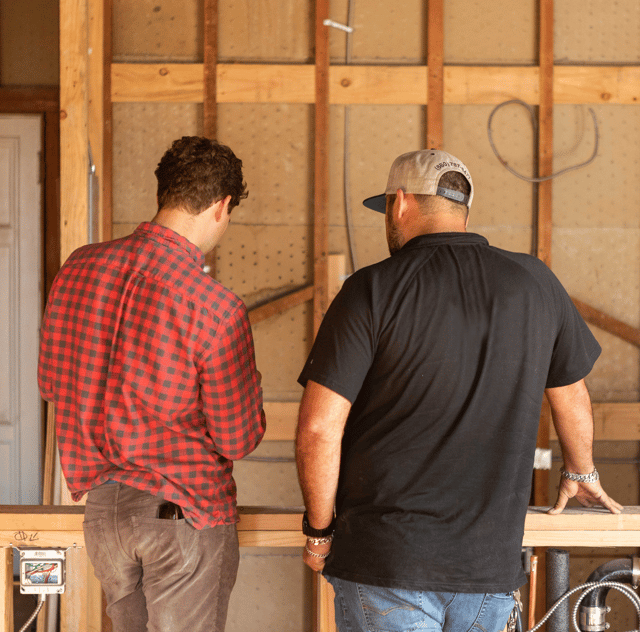.jpg?width=640&name=b97c58e1-30d5-4c11-980a-d6a4a41b7b30%20(1).jpg)
Working with Contractors
Labor Costs to Remodel Your Bathroom
01.06.2026


In This Article
Renovating your home is a big decision, often sparking the question: should you Do It Yourself (DIY) or hire a professional? In this post, we explore both pathways to help you make the best choice. We'll break down the pros and cons of doing it yourself versus hiring skilled contractors.
From understanding the costs and quality considerations to the impact on timelines and safety compliance, we've got all angles covered. Dive in to know which renovation approach aligns best with your needs, skills, and budget!
Choosing between a DIY approach and hiring professionals for home renovation projects is a pivotal decision that shapes the entire renovation experience. The DIY method empowers homeowners to engage directly with the renovation process, often appealing to those with a knack for hands-on tasks and a desire for personal engagement. This approach can be rewarding and cost-effective, allowing for flexibility in how and when tasks are completed.
Conversely, opting for professional contractors brings a wealth of expertise and reliability to the table. Professionals are equipped to handle even the most complex renovations with skill and efficiency, ensuring that every detail meets industry standards and safety regulations. Let’s talk about each option in-depth.
The DIY method in home renovation offers homeowners the chance to take matters into their own hands. It's an approach that can be both empowering and fulfilling, allowing you to directly shape your living spaces according to your vision. By handling the tasks yourself, you gain full control over the project's execution, from the initial planning to the final touches.
This method is ideal for those who enjoy hands-on work, possess the necessary skills, and seek personal satisfaction from their renovations.
The professional method for home renovation involves hiring experienced contractors to carry out the project. This approach is often chosen for its expertise and efficiency, especially for complex or large-scale renovations.
By entrusting the work to professionals, you can ensure that the renovation is completed to high standards, with attention to detail and adherence to safety regulations. This method suits homeowners who prioritize quality, prefer a stress-free experience, and seek the assurance of expert project management from start to finish.

When it comes to renovating your home, deciding between a professional or DIY approach can feel like standing at a crossroads. Each path has its own unique set of advantages and challenges, much like choosing between a scenic hike or a guided tour. DIY projects allow you to get hands-on, offering a personal touch and potentially saving money.
Meanwhile, professional renovations promise expertise, letting you sit back and watch your vision come to life under skilled hands. Understanding what sets these methods apart can help you choose the option that fits your lifestyle, skills, and renovation goals.
The decision between DIY and professional renovations often hinges on various crucial aspects such as project management and efficiency, cost implications, quality of work and longevity, safety and legal compliance, flexibility and personal involvement, and other additional factors.
Each of these elements plays a significant role in determining whether a hands-on approach or expert guidance is the best fit for your renovation journey. Understanding these differences can help you weigh your options and align them with your specific needs and goals for a successful home transformation.
Project management and efficiency are vital components of any successful renovation, and they differ significantly between DIY and professional methods. In a DIY project, you serve as the project manager, responsible for planning, scheduling, and ensuring each task is completed on time. This requires a lot of organization and can become overwhelming, particularly for complex renovations. However, it allows you complete control over the timeline and process.
In contrast, professional contractors manage every aspect of the project from start to finish, leveraging their experience to streamline the process. This often results in a quicker and more efficient completion since professionals know how to coordinate different tasks, manage potential delays, and handle unexpected challenges effectively. This not only saves you time but also minimizes the stress and complexity involved in managing a renovation project on your own.
Cost implications are a critical factor when deciding between a DIY or professional renovation. With DIY renovations, homeowners typically reduce costs by avoiding labor fees, which can constitute a significant portion of the total budget. For instance, painting a room DIY might cost around $200 for supplies, whereas hiring professionals could range from $800 to $2,000, according to HomeAdvisor estimates.
On the other hand, professional renovations, while initially more expensive, may save money in the long run by avoiding costly mistakes and ensuring high-quality finishes. According to the National Association of Home Builders, a major kitchen remodel could cost approximately $30,000 to $50,000 when done professionally, but attempting it DIY might lead to unforeseen expenses due to errors or the need for future corrections. Therefore, weighing these cost implications against your budget and renovation goals will guide you in making a financially sound decision.
Quality of work and longevity are vital considerations when choosing between DIY and professional home renovations. With DIY projects, the quality largely depends on your own skill level and craftsmanship. While rewarding, there's a risk of inconsistencies or errors that might require redoing or repairing sooner than anticipated, possibly affecting the longevity of the renovation.
In contrast, professional renovations often guarantee high-quality outcomes. Experienced contractors bring expertise, ensuring the work meets industry standards and is built to last. They use durable materials and proven techniques, which can enhance the longevity of your renovation project. While this professional touch may come at a higher initial cost, it often translates to fewer repairs and a longer lifespan for your investment. This peace of mind is invaluable, particularly for significant home improvements.
Safety and legal compliance are crucial aspects that can significantly impact the outcome of a home renovation project. When opting for a DIY approach, homeowners must be vigilant about following safety guidelines, as the lack of professional training can lead to accidents or unsafe living conditions. Moreover, navigating local building codes and obtaining necessary permits can be daunting without professional guidance, potentially leading to legal issues.
On the other hand, professional contractors are well-versed in safety protocols and legal requirements, ensuring that all aspects of the renovation comply with local regulations. They handle the often complex paperwork and inspections needed to secure permits, providing assurance that the work is both safe and legally compliant. This advantage not only safeguards your investment but also protects the safety of your household.
Flexibility and personal involvement are where DIY renovations truly shine, offering homeowners the ability to tailor the project exactly to their liking. With DIY, you can make on-the-spot decisions, adjust timelines to fit your personal schedule, and inject your creativity directly into every aspect of the renovation. This approach allows you to work at your own pace and gives you the satisfaction of seeing your vision come to life through your own efforts.
In contrast, professional renovations offer less flexibility in terms of direct involvement, as contractors typically follow a predefined plan and schedule. While this might mean fewer opportunities for spontaneous changes, it also reduces the stress and time commitment on your part. Professionals manage the details, allowing you to focus on the bigger picture without getting bogged down by day-to-day decisions. This can be ideal for those who prefer a more hands-off approach while still ensuring the end result aligns with their original concept.

Choosing between DIY and contractor work for your home renovation involves assessing your unique circumstances, skills, and goals. Start by evaluating the scope and complexity of the project. Simple tasks like painting might be manageable on your own, but larger, more technical projects might benefit from professional expertise. Consider your budget, as DIY can save money upfront but might lead to additional costs if mistakes occur.
Time is another crucial factor; DIY projects typically require more time investment, whereas professionals can work more swiftly due to their expertise. Think about the importance of quality and longevity in your renovation—higher stakes might justify hiring a professional.
Finally, assess your comfort level with handling the legal and safety aspects of the work. Weighing these considerations will help determine the best approach for your renovation needs.
You Have the Necessary Skills and Knowledge
Opting for DIY is a smart choice if you possess the necessary skills and knowledge to handle the tasks involved. Your expertise allows you to navigate challenges confidently, ensuring quality results. With a solid understanding of the work, you can approach your renovation project with assurance.
Budget Constraints Are a Priority
When budget constraints are a significant consideration, DIY projects can present a cost-effective solution. By eliminating labor costs, you can allocate more of your budget towards quality materials and unique design elements.
The Project Allows for Flexibility in Timing
If your renovation project doesn't have a strict deadline, the DIY approach provides the flexibility to work at your own pace. This allows you to take the time needed to ensure each part of the project meets your expectations without the pressure of a contractor’s schedule.
Personal Satisfaction and Customization are Important
DIY renovations offer the ultimate opportunity for personal satisfaction and creativity, allowing you to customize your home exactly as you envision it. This hands-on involvement means every detail can reflect your personality and preferences, resulting in a uniquely personalized space.
The Project Requires Specialized Skills or Equipment
Choosing professional work is wise when your renovation involves specialized skills or equipment that are beyond your expertise. Professionals have the training and tools needed to handle complex or technical tasks efficiently and safely.
Quality and Longevity are Critical
When quality and longevity are paramount, hiring professionals ensures that the work is done to the highest standards. Their experience and meticulous craftsmanship guarantee a durable and lasting renovation.
You Need to Adhere to a Strict Timeline
Choose professional contractors if your renovation needs to be completed within a set timeframe. Their structured project management and expertise help keep everything on schedule without sacrificing quality.
Legal and Safety Compliance is a Concern
Professionals are well-versed in local building codes and safety regulations, ensuring your project's legal compliance and reducing risks. Their knowledge helps navigate the necessary permits and inspections smoothly.
Stress-Free Experience and Warranty are Desired
If you prefer a stress-free renovation experience, professionals offer project management and warranty options that provide peace of mind. This ensures that any post-renovation issues are resolved without hassle, offering long-term assurance.
In conclusion, choosing between DIY and professional renovation depends on your skills, budget, and the complexity of the project. Whether you enjoy hands-on involvement or prefer the assurance of expert craftsmanship, both approaches have their merits.
By carefully assessing your needs and priorities, you can confidently decide on the best path for your home renovation journey.

Written by Block Renovation

Renovate confidently with Block
Easily compare quotes from top quality contractors, and get peace of mind with warranty & price protections.
Thousands of homeowners have renovated with Block

4.5 Stars (100+)

4.7 Stars (100+)

4.5 Stars (75+)
.jpg?width=640&name=b97c58e1-30d5-4c11-980a-d6a4a41b7b30%20(1).jpg)
Working with Contractors
Labor Costs to Remodel Your Bathroom
01.06.2026

Working with Contractors
How to Hire a Contractor for Bathroom Remodels
12.29.2025

Working with Contractors
Six Alternatives to Angi (Formerly Angie’s List)
12.19.2025

Working with Contractors
The Block Way of Renovating: A Complete Homeowner’s Guide
11.24.2025

Working with Contractors
Steps to Vetting a General Contractor
11.04.2025
Renovate confidently